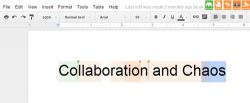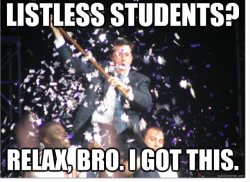
Or, The Power of Crowdsourcing Assessment.
Like a lot of instructors at UT, I have required presentations in my classes and over the years, these presentations have taken a lot of different forms, from three solid days of argumentative presentations to close out the semester in my first-year writing class, to having students introduce a critical section of the text and lead discussion in my current literature class. One thing that hasn't changed, though, is the way I assess presentations. Which is to say: I don't.









